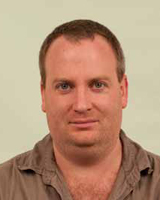Meade, Andrew

Personalia
Andrew Meade, born Kingstone, England, in 1977. Ph.D. from University of Reading. Researcher in Computational Biology at the University of Reading, UK.
Theme Group Fellow (1 September – 30 November 2015)
Adapting phylogenetic algorithms from bioinformatics to Linguistics
Research Question
How can methods designed for molecular evolution be applied to linguistic and cultural evolution?
Project Description
The study of phylogenetics (evolutionary history’s) are an essential analytical technique used in almost all areas of biology from virology and immunology, to protein evolution, from protein networks to evaluating extinction risks and from organismal studies to the analysis of gene evolution. Over the past 30 years phylogenetic methods have made huge progress in terms of accuracy by developing more complex and realistic methods.
Linguists have similar interests in languages and cultures as biologists have in species and molecules. Linguists build phylogenies to study how languages are related and how they change over time. This project aims to develop and apply methods designed for studying biological evolution to build better language phylogenies.
Selected Publications
1) Pagel M, Atkinsonc Q, Caluded A, Meade A , Ultraconserved words point to deep language ancestry across Eurasia, PNAS, 2013
2) Daniel J. Hruschka, Simon Branford, Eric D. Smith, Jon Wilkins, Andrew Meade, Mark Pagel, Tanmoy Bhattacharya. Detecting Regular Sound Changes in Linguistics as Events of Concerted Evolution. In Current Biology, Vol. 25 Issue 1, Pages 1 to 9, 2015. 10.1016/j.cub.2014.10.064
3) Venditti, C., Meade, A., & Pagel, M. (2011). Multiple routes to mammalian diversity. Nature, 479(7373), 393-396.